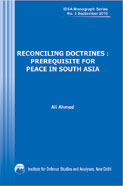Reconciling Doctrines: Prerequisite for Peace in South Asia
 India and Pakistan have had a strained relationship since Independence. Their relations have been marred by wars and a series of crises. This is owing to several reasons such as: a territorial dispute, power asymmetry, differing political systems, identity related issues, external power manipulation and a growing economic disparity. While the two states have a ‘peace process’ ongoing between them, this is subject to buffeting caused by events such as the terrorist action of Mumbai 26/11. In light of nuclearisation in 1998, this continuing distrust may prove costly and dangerous in case of future hostilities. This paper suggests an approach towards building conditions necessary for peace between India and Pakistan. Identifying the Pakistani army as a power centre in Pakistan, the hypothesis is that a strategic dialogue with it would achieve doctrinal balancing and help mitigate its threat perception.
India and Pakistan have had a strained relationship since Independence. Their relations have been marred by wars and a series of crises. This is owing to several reasons such as: a territorial dispute, power asymmetry, differing political systems, identity related issues, external power manipulation and a growing economic disparity. While the two states have a ‘peace process’ ongoing between them, this is subject to buffeting caused by events such as the terrorist action of Mumbai 26/11. In light of nuclearisation in 1998, this continuing distrust may prove costly and dangerous in case of future hostilities. This paper suggests an approach towards building conditions necessary for peace between India and Pakistan. Identifying the Pakistani army as a power centre in Pakistan, the hypothesis is that a strategic dialogue with it would achieve doctrinal balancing and help mitigate its threat perception.
The Pakistani army, operating with a realist mindset – as is the wont of militaries – takes a negative view of the power asymmetry with India. Consequently, it has resorted to strategies of external and internal balancing such as relying on external powers, going nuclear, waging proxy war and resorting to terror as a ‘strategic tool’. India, for its part, has attempted to address Pakistan’s sense of insecurity by addressing outstanding issues through the composite dialogue process and instituting confidence building measures. Despite gains, these are yet to compensate for the trust deficit between the two states. This paper suggests an additional measure to directly address the perception of asymmetry held by the Pakistani military which is main reason for the ‘trust deficit’.
The recommendation is for a ‘doctrinal balancing’ between India and Pakistan on a strategic dialogue forum. A mutual and balanced doctrinal drawdown, involving Pakistan discontinuing its proxy war at the subconventional level, and India moving towards a defensive doctrine on the conventional level, is presented in this paper as the prerequisite for peace in South Asia. To make the nuclear overhang recede further, changes are necessary in the nuclear doctrine of both states also. This would foster conditions of security and managing of perceptions necessary for tackling outstanding issues between the two states.
Download Monograph
Order Hard Copy
Please email us at publication [at] idsa.in or call +91-11-2671 7983 (Ext. 7322)




